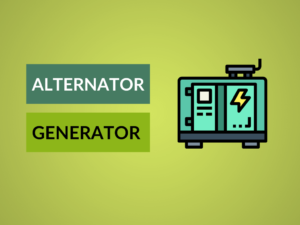Alternator vs. Generator: Understanding the Differences
Have you ever wondered about the differences between an alternator and a generator? While they both generate electricity, there are key distinctions that set them apart. In this article, we will delve into the definitions, examples, uses, and ultimately the differences between alternators and generators. By the end, you’ll have a comprehensive understanding of these two power sources and their unique applications. So, let’s get started!
What is an Alternator?
An alternator is a device that converts mechanical energy into electrical energy. It is commonly used in vehicles to charge the battery and power the electrical system. Alternators typically consist of a rotor, stator, diodes, and a voltage regulator. When the rotor spins inside the stator, an alternating current (AC) is generated that is converted into direct current (DC) by the diodes.
Examples of Alternators
Alternators can be found in various applications, including:
- Automobiles
- Motorcycles
- Ships
- Aircraft
Uses of Alternators
Some common uses of alternators include:
- Charging the battery in vehicles
- Providing power for electrical systems in vehicles
- Generating electricity in remote locations (e.g., generators)
What is a Generator?
A generator, also known as a genset, is a device that converts mechanical energy into electrical energy. Unlike an alternator, a generator produces direct current (DC) or alternating current (AC) that can power various electrical devices. Generators are commonly used during power outages, in construction sites, and in remote areas where access to electricity is limited.
Examples of Generators
Generators can take different forms and serve a variety of purposes. Some notable examples include:
- Standby generators
- Portable generators
- Industrial generators
- Solar generators
Uses of Generators
Generators find applications in a wide range of situations, such as:
- Providing backup power during outages
- Powering construction and mining equipment
- Supplying electricity to remote areas without access to the grid
- Supporting outdoor events or recreational activities
Differences Table: Alternator vs. Generator
| Difference Area | Alternator | Generator |
|---|---|---|
| Output | Produces AC power | May produce AC or DC power |
| Efficiency | Higher efficiency | Slightly lower efficiency |
| Application | Commonly used in vehicles | Used as a standalone power source |
| Voltage Regulation | Voltage regulation is simpler | Requires more complex voltage regulation |
| Power Output Control | Often controlled automatically | Requires manual control |
| Size | Smaller in size | Often larger in size |
| Cost | Generally more affordable | Can be costlier, depending on the type |
| Portability | Less portable | Portable options available |
| Longevity | Longer lifespan | Shorter lifespan |
| Noise | Produces less noise | May produce more noise |
Conclusion:
In summary, alternators and generators are both valuable devices that generate electricity, but they differ in terms of output, efficiency, application, voltage regulation, control, size, cost, portability, longevity, and noise. Alternators are commonly used in vehicles, while generators serve as standalone power sources for a wide range of applications. Understanding these differences can help you choose the right power solution for your specific needs.
Knowledge Check:
- Which device is commonly used in vehicles?
a) Alternator
b) Generator
Answer: a) Alternator - What type of power does a generator produce?
a) AC power
b) DC power
c) Both AC and DC power
Answer: c) Both AC and DC power - Which device requires more complex voltage regulation?
a) Alternator
b) Generator
Answer: b) Generator - Which device is more portable?
a) Alternator
b) Generator
Answer: b) Generator - Which device has a longer lifespan?
a) Alternator
b) Generator
Answer: a) Alternator - Which device is generally more affordable?
a) Alternator
b) Generator
Answer: a) Alternator - Which device is commonly used during power outages?
a) Alternator
b) Generator
Answer: b) Generator - Which device is often controlled automatically?
a) Alternator
b) Generator
Answer: a) Alternator - Which device is smaller in size?
a) Alternator
b) Generator
Answer: a) Alternator - Which device may produce more noise?
a) Alternator
b) Generator
Answer: b) Generator
Related Topics:
If you found this article helpful, you may also be interested in the following topics:
- Understanding AC and DC Power
- Choosing the Right Power Source for Your Needs
- Tips for Maintaining Alternators and Generators


